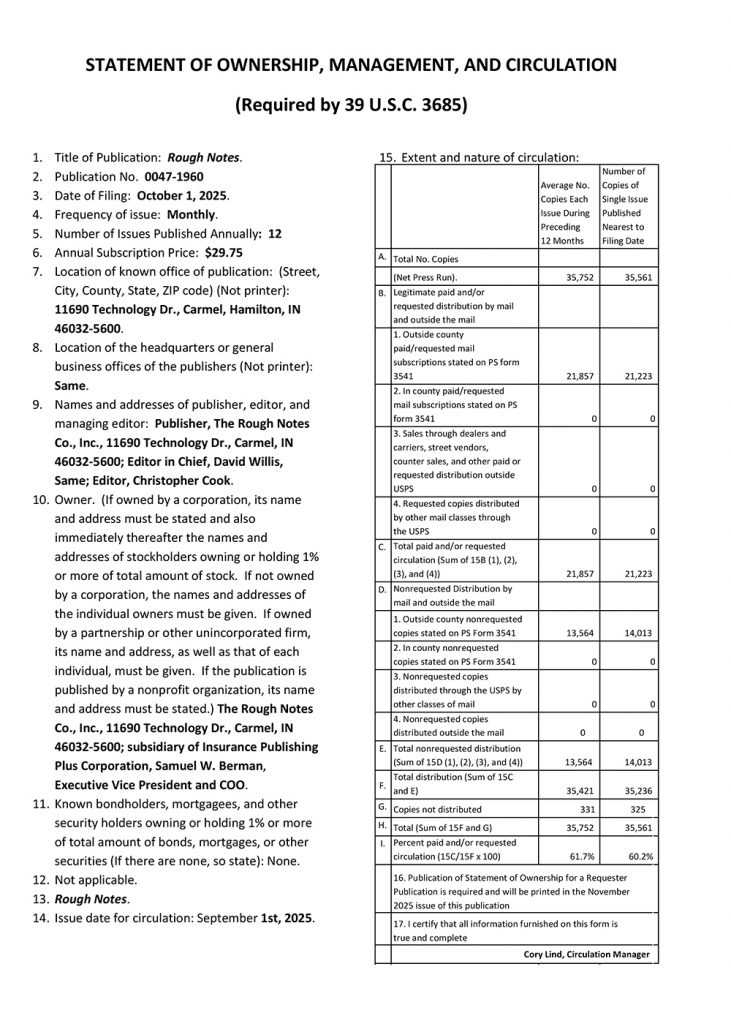 Thoughts on trust, mutual respect,
Thoughts on trust, mutual respect,
support in hard times, and emotional connections
As both a force and an emotion, loyalty can be a powerful
influence in bringing people together or deeply dividing them.
By Dr. William T. Hold, CIC, CPCU, CLU
Loyalty, one of the most important elements in human relationships, has for ages been a subject of great debate and concern. A force for both great good and a tool for the devil, loyalty has probably never been more important than today. In fact, in the minds of many people, loyalty is essentially a “dead dog.” It pervades almost every aspect of our lives, be it personal or business.
Loyalty is fundamentally a state of mind, not defined by some random grouping of words. The intensity, feeling, and direction of loyalty can change rapidly. Furthermore, understanding and dealing with loyalty in an effective manner is made even more difficult by the fact that it is founded on “mutually beneficial relationships.” And these relationships can and often do change rapidly and in unexpected ways.
Adding to this mix of considerations is the fact that loyalty is directly impacted by security, financial, and emotional stakes in the mutually beneficial relationship. The higher the financial and emotional stakes become, the more volatile, important, and clouded loyalty becomes.
As I was advised by a wealthy insurance leader in a debate, “Dr. Hold, my loyalty lasts only as long as my surplus.”
Loyalty is mercurial in nature and is prone to being unpredictable and volatile. As both a force and an emotion, loyalty can be a powerful influence in bringing people together or deeply dividing them.
When the term loyalty is initially mentioned in conversations, it often evokes a positive connotation. However, as we have learned from the “crucible of life’s experience” loyalty does not always produce good or positive results.
Being loyal to a cause, deity, person, group, or government has, in many instances, produced disastrous consequences for entire countries, populations, and in some cases the whole world. Important examples include world wars, genocides, dictatorships, rebellions, and the Spanish Inquisition. Never underestimate the consequences of the simple unyielding, and in some instances, misguided loyalty to “oneself.”
A good idea at the time
One can legitimately ask, how could all of these consequences involving loyalty have happened? An old Texas philosopher once explained why bad things happen and terrible decisions are made with a very simple answer: “It just seemed like a good idea at the time.” Underlying this philosopher’s answer is the recognition of the enormous power of the human mind to produce great good or great evil.
We cannot ignore the fact that the human mind is the most powerful mechanism for rationalization ever created. The human mind can manipulate any data set, any situation(s), any belief or set of beliefs, and any event(s), positive or negative, into a decision or action that just seemed like a good idea at the time. Regardless of potential negative consequences, as long as the decision seemed to be a good idea for the individual or group, the decision was accepted.
Let us never forget that, in many instances, self-interest rules the day!
Mutually beneficial relationships—
a dying dog?
Depending on the strength of the mutually beneficial relationships of the parties involved, loyalty can be a powerful long-term force binding individuals and groups together. In some ways loyalty is like a two-headed coin that individuals keep in their pocket or purse to flip as relationships change or new ones develop.
Unlike the two-headed coin we commonly see that has two different sides, one winning and one losing, the loyalty coin we want to own, maintain, and keep has two winning sides, in short, the mutually beneficial coin.
An important but difficult question is, “Why have so many people come to believe that loyalty is, at best, a dying dog?” Have people really changed that much in recent years?
While the fundamental characteristics of people have not dramatically changed, their circumstances and relationships have. Be they personal or business-related, relationships have become easier to alter or terminate. People and populations are more mobile than ever before.
There is an enormous amount of information and misinformation available on an almost instantaneous basis. A significant amount of this information tends to divide people and plant the seeds of distrust.

Since there is an overwhelming notion that success and wealth can be attained in a very short time span, success now becomes the overriding goal. While there are real-life cases where this is true, they remain the exception.
The above listing is not exhaustive and it does not support the more traditional underpinnings of loyalty. These include a sense of being an important part of a relationship; a long-term commitment and faith in the values and goals of the relationship; and trusting that the relationship will be reciprocal, fair, and offer support under difficult circumstances in the long term.
All of these are easy to say and support, but they are far more difficult to successfully carry out in practice. And they will probably become more difficult in the future.
Foundations built on action
Loyalty is built on a foundation of demonstrated action by the parties in the relationship, not by words or wishful thinking—a foundation that will not be built in a matter of weeks or months.
Trust, mutual respect, support in hard times, and emotional connections are achieved through the actions of the parties in the relationship. Don’t just tell me or promise me, just do it. These are the bywords of building loyalty.
How ’bout them dogs?
Dogs and loyalty, what’s that really about? What have we learned over time? When you hug your dog, pay attention to it, play with it, share the good times, encourage and compliment the dog with treats, feed it well, and provide good medical care, it will be loyal and won’t “bite you in the butt.”
The author
William T. “Doc” Hold, Ph.D., CIC, CPCU, CLU, is chairman emeritus of The Risk & Insurance Education Alliance, which he co-founded in 1969 as The Society of CIC. Under his leadership, The Alliance has grown to become one of the most prestigious insurance education organizations in the world. In this column Doc shares his personal insights and opinions, which are not necessarily those of The Alliance or its board members.





